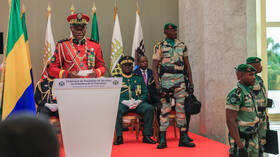US labels African nation’s military takeover a ‘coup’ after two months

The seizure of power from President Ali Bongo Ondimba in August by the new military authorities in Gabon was a “coup d’état,” the US government has concluded.
Washington's foreign assistance to the Gabonese government, which was temporarily halted last month in response to the coup, will now be suspended, US State Department Spokesperson Matthew Miller said in a statement on Monday. However, it added that humanitarian, health, and education aid to the Central African country will continue.
“We will resume our assistance alongside concrete actions by the transitional government toward establishing democratic rule. We will continue to work closely with the Gabonese people and regional partners,” Miller said.
The statement did not specify which US-funded programs would be suspended or how much money would be put on hold.
Ali Bongo was deposed by Gabonese soldiers on August 30, shortly after being declared the winner of the country's disputed presidential elections. Bongo took office in 2009 and ruled for more than a decade. He succeeded his father, Omar Bongo, who had ruled Gabon for 42 years.
General Brice Oligui Nguema, who was sworn into office as interim leader for the military government, promised during his inauguration earlier last month to hold “free” and “transparent elections” without specifying a date. He said a new government would be formed in a “few days” and proposed reforms such as a referendum on a revised constitution, new electoral legislation, a new penal code, and measures to promote economic development.
Opposition leader Raymond Ndong Sima, who was installed as prime minister by the military, was quoted by AFP news agency in September as saying that a 24-month transition period in Gabon would be "reasonable."
Washington said on Monday that it was committed to supporting Gabon in "conducting a timely and durable transition to democratic civilian governance and advancing shared security interests in the Gulf of Guinea.”
Gabon is the most recent former French colony to be taken over by the military. It follows the overthrow of Niger's President Mohamed Bazoum in July. The US has suspended some aid to Niger and only recently officially designated the incident in the West African country as a coup after months of hesitating, reportedly due to policy implications.
Washington, which maintains a contingent of 1,000 soldiers in Niger, has said disengagement was not an option and that it will forge “pragmatic” relations with the new military authorities.
Meanwhile, France has been forced to cut ties with the Niamey coup leaders, whom it refuses to recognize as legitimate authorities. In contrast, it appears to have agreed to work with the new Gabonese authorities, with French Armed Forces Minister Sebastien Lecornu previously telling the media that the situation in the Central African country cannot be compared to the one in Niger. While Paris has begun withdrawing troops from Niamey’s bases, it announced in early September that French military operations in Gabon were being resumed "on a case-by-case basis" after being suspended over a week ago in response to Bongo's ouster.













